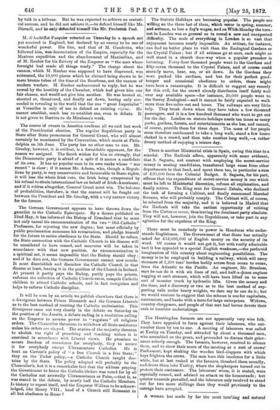M. d'Audriffet Fasquier retorted on TOnrsday in a Ispeeoli ant
yet received in England, but declared by an enemy to be one of wonderful power. His line, and that of M. Gambetta, who followed him, was denunciation of the Empire, especially for the Mexican expedition and the abandonment of Maximilian, and of M. Rouher for his flattery of the Emperor as "the man whose foresight had made all things ready." The charge about the cannon, which M. Rouher was supposed to have disproved, was reiterated, the 10,000 pieces which he claimed being shown to be mere bronze tubes of the time of the Bourbons, not the cannon of modern warfare. M. Rouher endeavoured to reply, but he was cowed by the hostility of the Chamber, which had given him one fair chance, and would not give him another. He was hooted at, shouted at, threatened, and finally sat down, having only suc- ceeded in revealing to the world that the one "great Imperialist" at Versailles is only of use to defend an existing regime. He cannot establish, much less re-establish one, even in debate. It is not given to Barrere to do Mirabeaa's work.


































 Previous page
Previous page